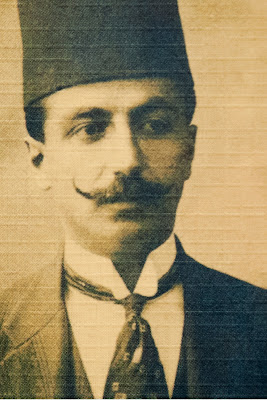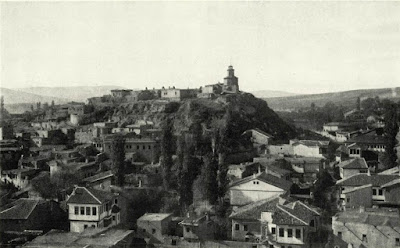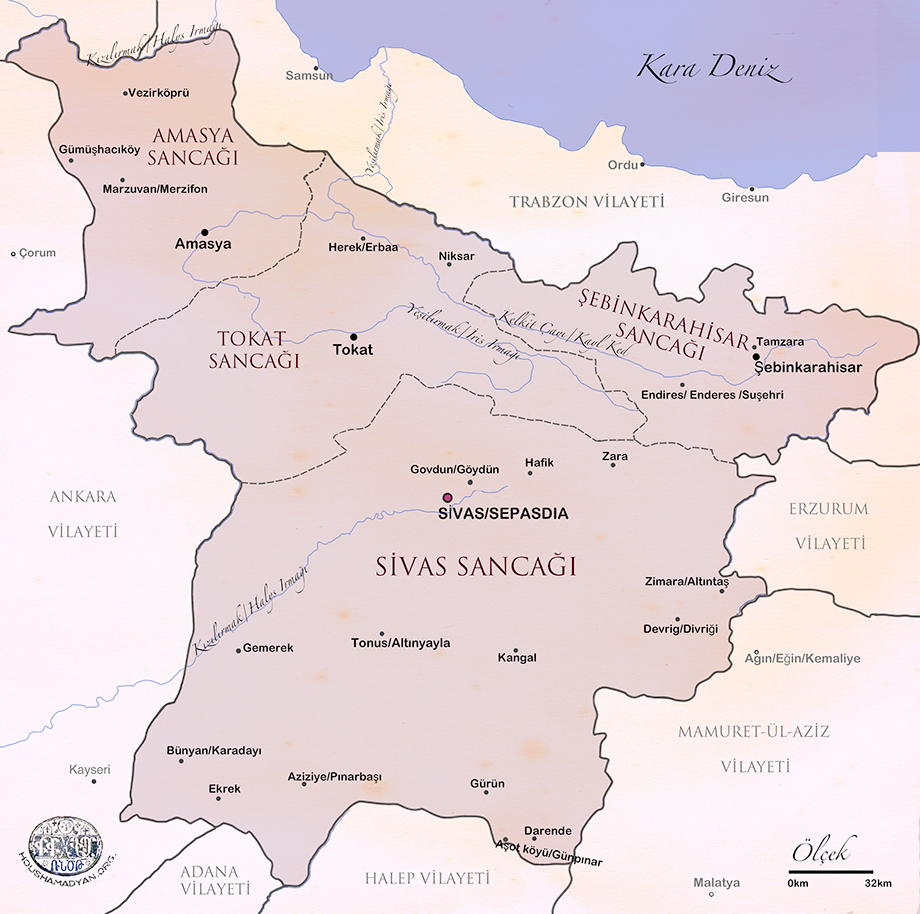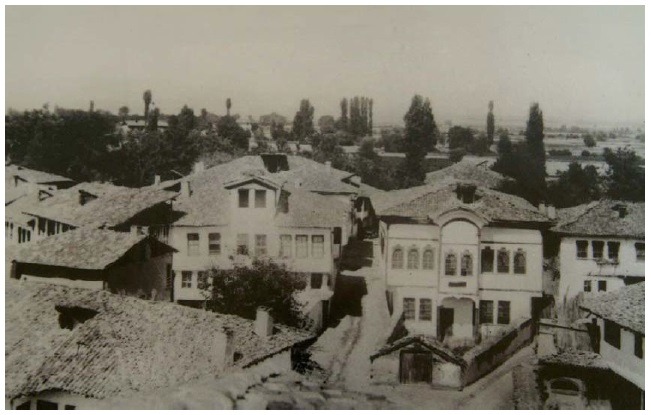
M.Fuad Tokad
20 January 1915
We left Yenihan in the morning and, making our way through the
snowy landscape, we left it behind us. About a kilometer ahead of us
we saw a wide valley. The Kızılırmak flows through here and there are
two bridges, one big one small. Scaling a small hill in front of us we
entered Sivas. Here we were met by a member of the Sivas National
Defense Society and housed in an office of the Public Council. In
the evening, beds, a heater and other things were sent to us from the
National Defense Society. There are a number of buildings here, one
of which is the War Revenues building and there is a hotel named
Afyonian but it’s quite ordinary. For travel though it’s a good hotel.
Not many boarding houses. At night we had coffee with the Sivas
Defense Society member. The coffee cups are quite large. I was
amazed. About 35 centimeters high with a base of 20 or 25
centimeters. The tops are 15 or 20 centimeters. A bit later we
again returned to our place.
21, 22 January 1915 (no entries)

Sivas in 1915
23 January 1915
Sivas: rather large. When approaching the city from the west
and entering it from the Government Office side the most striking
sight is the Government Office itself. Near here there is a high
school. These are essentially nondescript. There are a couple of
kitchens that resemble restaurants and a few coffeehouses. The
streets are narrow and dirty. İ didn’t like the market but there are
one or two stores that stand out. The building that the Red Crescent
has taken over is not bad. There are quite a few mosques and
religious schools. Most are being fixed but the city itself needs quite
a bit of repair work. The people are very sociable. But there are
lots of Armenians. They’re progressive and provide all the skilled
workers. Almost everything that looks good is the Armenians. They
control all trade and crafts. This is regrettable. In any case, two new
Turkish companies have opened up but they’ve just started...we
purchased this and that here. I spent quite a bit of money. I sent my
father a telegram saying that I’d come to Sivas and that I was
leaving here. Of course, I wrote a letter and to my friends as well.
24 January 1915
At noontime a musical group was passing by the Court House where
we were sitting. There were little children in the group along with
people in their 70’s and 80’s. They Each had a stick in their hand and
a pouch on their back. They wore sandals. Apparently, they were
bringing bulgur, lentils and other things from their village as gifts
for us. Of course it was all aid for the army. I was very touched and
in fact I cried. At mid-day It was decided that we would move onward
today,based on the order of the Acting Third Army Commander in
Sivas. Since the Transport Command there didn’t have any vehicles
they gave us mules or horses. Even though we made a request to the
commander that this movement be delayed until tomorrow it wasn’t.
There were 40 to 50 of us reserve officer candidates here. Some
cavalry, some transport and the rest infantry. Toward evening we
mounted the horses we were given with our belongings and said
farewell to Sivas. Shortly afterwards night fell. Four of us – myself,
Enver, Çelebi (cavalry) and İzzet - went ahead of the convoy.
Although the other fellows stopped at an Armenian village nearby,
the four of us continued on and after passing a village we stopped
at the town of Koçhisar at about six in the evening, where we spent
the night on a couch and chair in a room belonging to the government.

Sivas province in the last years of the Ottoman Empire.
Fuad Bey proceeded east from Sivas via Zara.
25 January 1915
In the morning we settled into a room in (Gendarmerie) Sergeant
Abdi’s inn. At mid-day the other fellows showed up. We stayed here
today. Koçhisar is like an ordinary village. At night some of the
fellows drank rakı and they argued with Sergeant Abdi about
something. Cavalaryman Fazlı (from Amasya) was quite rude
and made a scene. He was reproached.
26 January 1915
We said farewell to Koçhisar in the morning, departing on horseback.
We passed Yarhisar village before stopping at Tödürge Gendarmerie
Station, where we had lunch. Around evening we reached Zara
(Koçkiri) town center and went to an inn. I liked this place. The road
from Sivas to here is well-paved and there are nice homes. But there
are quite a few Armenians.
27 January 1915
We departed from Zara in the morning. A couple of hours later the
terrain, which up to here had been flat, changed. We were faced with
mountainous, rocky land. A bit further on we started to see snow for
the first time. By evening we reached Keçeyurdu and the four of us
stayed in the home of an Armenian. This place is run-down.
28 January 1915
In the morning we left Keçeyurdu and came to Su (Inderesi) town
center toward evening. We went into the home of an Armenian but
this man was quite rude to us. He took all the furniture out of the
room we would sleep in. We didn’t pay it any mind and spent the
night.

Armenian homes in Erbaa, Sivas province, 1915.
We Are Guests in an Armenian’s Home
29 January 1915
We had a restful day here. I saw my fellow Ankara friend Cevat
(the major’s son). In the morning the Armenian decided that we were
good fellows and brought a couch and a mattress. In the evening we
had dinner at the market. When we went home the Armenian joined
us and we talked. Suddenly a child came and said the Armenian’s
daughter-in-law had feinted. Right away I gave him two of the medical
pills and ether that I had brought with me from Sivas. I said he should
have her take the pills and smell the other. A bit later the Armenian
came back, saying that he was very grateful.
30 January 1915
The Armenian served us a fine breakfast with tea and foods he had
cooked. After eating he saw us off, so we said farewell to the city of
Su. Of course, its beauty enchants a person. Trees, wetlands, nice.
But the town is ordinary, run-down. We passed by a few villages (at
one of them we ate bulgur rice at about mid-day) and in the evening
we reached the township of Ezbider. We settled into a filthy room
and went to a coffeehouse at night. We chatted with some Tatar
Russian prisoners. Up to here, we had seen one or two other posta
prisoners. At night I fired at an attacking dog.
31 January 1915
We left here in the morning and came to Karasu village in the
evening, where we stopped. This place is filthy, the streets are full
of foul water but the stream is beautiful. I gave them some ammonia
here and they were very grateful.
Fuad Bey's diary and its matchbox container.

Hiç yorum yok:
Yorum Gönder